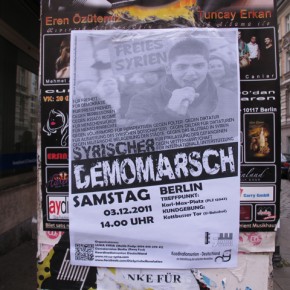Jews, rejoice! It’s a miracle! Israel has been saved once again from the menace of those who rise up in every generation to annihilate us! Over 1,000 activists were planning to fly to Israel and protest the occupation. Imagine the terror that would have wrought! Luckily, Benjamin Netanyahu saved us from another Holocaust!
If that seems sarcastic, it is nothing compared to the obnoxious and rude letter the Prime Minister’s office distributed to those activists. Here is the full text:
The Israeli government had to eventually admit that some 40% of the people it barred from coming to Israel last weekend were not intending “to do anything illegal.” The other 60% were planning to join a Palestinian protest of the Israeli occupation which will celebrate its 45th birthday in two months. That was their only expected “crime.”
Diplomats, and even Israeli citizens ended up being caught in the net of the Shin Bet, Israel’s domestic security service. Israel threatened sanctions against European airlines that allowed any of the listed passengers to board their flights.
Yes, the horror of those activists. Imagine, the racists were coming to protest the Middle East’s only democracy, just because it has held millions of people under a brutal military occupation, stealing their lands, homes and natural resources, and denying them civil and human rights for four and a half decades. Surely, they must be the descendants of the Egyptians who enslaved us, the Romans who exiled us, the Inquisitors who tortured and terrorized us, and the Nazis who killed us.
Now, in all seriousness, one cannot ignore the reality that these activists do not have the option of entering Iran, Syria or Gaza with the explicit purpose of protesting those governments’ human rights records. That is not a point to be taken lightly.
Indeed, they come to Israel instead precisely because, among other reasons, Israel is a more open society and, as such, it is expected to tolerate protest and to allow those who object to its policies to enter the country. Sadly, Israel has once again proven it does not live up to its rhetoric of being democratic and open.
More importantly, though, the snotty letter Netanyahu publicly released rehashed a very tired defense of the occupation: How can you protest Israel when there are so much greater atrocities going on elsewhere in the world, and even nearby in the Middle East?
This is a very poor argument, that brings shame to Israel, rather than defends the country against its critics. What is Netanyahu saying here? That he considers it a point of pride that Israel is not as bad as Syria? This is what the “only democracy” is hanging its hat on? By that logic, nothing short of full-scale genocide should bring protests, much less corrective or preventative action.
The fact of the matter is that Palestinian dispossession has been ongoing, certainly since 1947, and arguably for years before that. For almost 45 years, the West Bank has been under military occupation. In recent years, the face of that occupation has become more violent, more restrictive, and more entrenched.
Palestinians have lost their lands to settlements and military outposts. They have not known what it is like to be able to move around their own homeland without periodic stops at military checkpoints, at any of which they might be detained for hours, or, more recently, simply being cut off from work, school, relatives and medical care by a giant wall. They have faced escalating violence from settlers who attack them with impunity, and soldiers and border police who abuse them and bully them daily.
They have limited access to the water resources of their lands, they can be imprisoned for extended periods of time without charge. The list could go on, but you can see more of what occupation means at the web sites of such groups as al-Haq, B’Tselem, Gisha and others. What this describes is occupation and it must be an affront to any sense of decency. It is more than worthy of protest.
Indeed, leaving aside the exaggeration of the freedoms within Israel that are themselves under assault by Netanyahu’s extremist right-wing government, Israel’s ongoing occupation of the West Bank, its creeping dispossession of East Jerusalem’s Arab population and its siege of the Gaza Strip undermine any claims to democratic principles.
Security concerns, which are very real for Israel and are certainly much more pronounced than they are in the Western countries where most of the banned protesters hailed from, are not a blank check to deny millions of people basic rights. Using them as such contradicts the most basic and essential humanistic and universal values that are at the very heart of democracy.
This doesn’t mean Israel has to take unreasonable risks or ignore the real threats to their civilian population from various terrorist or militant groups. But those threats cannot and do not justify the massive violations of human rights that are endured by millions of innocent Palestinians
Certainly, one of the main reasons the occupation endures is the acceptance by so many governments and by so-called “supporters of Israel” (a misnomer, since they are actively preventing Israel from becoming a “state like any other”, which was the primary goal of the Zionist movement) of the idea that Israeli insecurity justifies the occupation. Therefore, only when Israel feels sufficiently safe, can millions of Palestinians be given the rights so many of us take for granted.
Both Palestinian freedom and Israeli security are important ethical and practical concerns. No solution can be found if it does not satisfy both. But for 45 years, the occupation has simply been a fact of life, and that has been true despite the fact that Israel has not faced anything approaching a serious threat to its existence from the Arab world since the end of 1973’s Yom Kippur war.
Yes, ending the occupation entails real risk for Israel. But those risks cannot realistically be painted as remotely similar to the threats Israel faced in its early years. More to the point, they do not stack up to the moral, physical and legal crimes of colonial occupation. The imperative, however many states one envisions as being the key to resolving this conflict, must be ending the occupation in a manner that ensures security for both Israelis and Palestinians. That represents a sharp change from what we have today, where the driving force is security for Israel, and maybe once that is fully ensured, we can talk about ending some part of the occupation.
While Netanyahu pats himself on the back with enormous hubris for being less of a human rights violator than Bashar al-Assad, he is presiding over a parliament that is attacking Israel’s democratic political structures, while he makes clear that the 45-year old occupation is going to be so entrenched that it cannot be moved. That raises a very high bar for democracy advocates. A lot more should be expected of the “Middle East’s only democracy” by Israelis, by Jews, and by the entire international community.
Photograph courtesy of Ariela R. Published under a Creative Commons license.







I enjoyed reading this article
Great post, Mitchell. Just one minor correction: the war of 1973 never put Israel’s existence under threat. It was a war to regain territory taken in 1967 and more importantly from the Arab perspective, to regain Arab pride. Since it was a war fought entirely in Arab land (the Sinai peninsula and the Golan heights were and still are Egyptian and Syrian territory respectively) to regain what had been forcibly taken from them, it was very much a counter-offensive rather than a war of aggression.
More importantly, the Arab states knew it was a limited war to regain their own territory as they had no illusions they would be nuked if they ever posed a real threat to Israel’s existence, with the blessing of the West, which has always been the supporter and enabler of Israeli expansionism and ethnic cleansing in Palestine.
Ahad,
It is not true that Israel’s existence was not under threat in 1973. Arab intent was, very likely, as you describe it here, though one can never know intent for absolutely certain. But that is not the point. Whether the Arabs intended to conquer Israel in ’73 is not the question. The threat was clearly there because, before the US airlift, the capability was there. In other words, it was POSSIBLE for the Arabs to press that war and they could have won. That is the point. Indeed, the issue at hand is not what would have happened but what could have happened, and it is as much a matter of perception as anything else. And, given the massive failure of the Meir government to heed not only the obvious realities around them as well as Sadat’s warnings, but also the warnings of numerous Israeli military leaders, Israel was certainly not feeling too certain of what Egypt and Syria would do.
Again, especially in retrospect, it is pretty clear that the UAR, such as it was by then, did not intend to press the war into Israeli territory, though Syria was not pleased that only Egypt got its land back. At the time, however, that was much less clear, and we cannot even now say with absolute certainty how things would have gone if the US did not come to Israel’s rescue. Today, we see that as a sure thing. In 1973, it was much less certain, as were many other things.
Oh, just for clarity, of course Egypt did not get its territory back in ’73. But that was where the end of the war was clearly pointing. Whereas the Golan…well, we see where that’s gone.
Well you are ignoring Israel’s nukes which was known even back then, which meant that even without US assistance, Egypt and Syria could not hope to press on without being turned into a radioactive desert. But anyway, it’s a theoretical debate on a minor detail in a great piece.
I think this is a terrific article.